Couple Of The Most Horrific Prisons In History Definitely Can Give You Nightmares
Kenneth Coo
Published
07/14/2017
in
creepy
Nothing better to tell you to avoid prison.
- List View
- Player View
- Grid View
Advertisement
-
1.
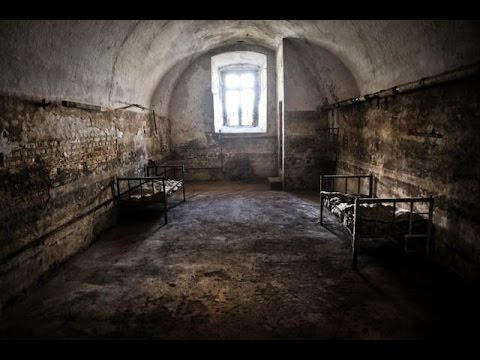 Pitesti was a Communist prison built in Romania, most famous for its intense and brutal brainwashing experiments. Operating from 1949-1951, the Pitesti Experimentattempted to "re-educate" wealthy intellectuals, bourgeois landowners, religious rebels, and political dissidents through psychological torture. Guards forced prisoners' heads into buckets of urine and feces. In an effort to get prisoners to turn on one another, guards made prisoners torture each other by spitting and urinating in each other's mouths, among other even more disgusting things.
Pitesti was a Communist prison built in Romania, most famous for its intense and brutal brainwashing experiments. Operating from 1949-1951, the Pitesti Experimentattempted to "re-educate" wealthy intellectuals, bourgeois landowners, religious rebels, and political dissidents through psychological torture. Guards forced prisoners' heads into buckets of urine and feces. In an effort to get prisoners to turn on one another, guards made prisoners torture each other by spitting and urinating in each other's mouths, among other even more disgusting things. -
2.
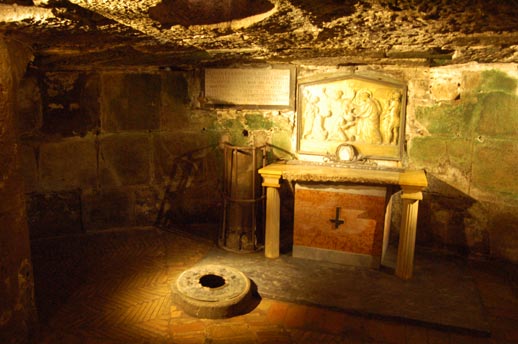 The Mamertine In Ancient Rome. The Mamertine's violence wasn't just brutal. In use since the 8th century BCE, the prison contained two floors of underground cells, one on top of the other, with the lower levels only accessible through holes in the upper levels. After torturous treatment and lack of food led to the deaths of many of the prisoners, guards disposed of their bodies in the Cloaca Maxima, aka the Roman sewer.
The Mamertine In Ancient Rome. The Mamertine's violence wasn't just brutal. In use since the 8th century BCE, the prison contained two floors of underground cells, one on top of the other, with the lower levels only accessible through holes in the upper levels. After torturous treatment and lack of food led to the deaths of many of the prisoners, guards disposed of their bodies in the Cloaca Maxima, aka the Roman sewer. -
3.
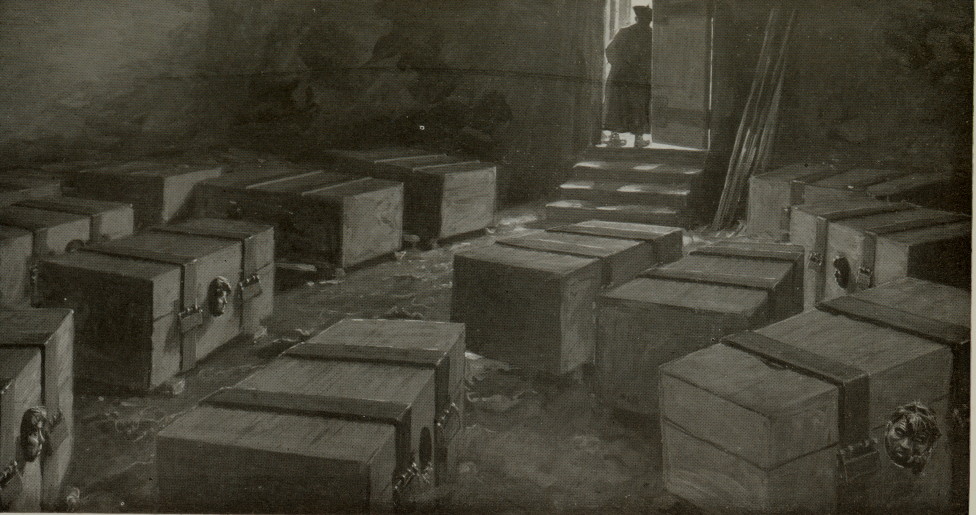 Prison at Urga, Mongolia. When explorer Roy Chapman Andrews, future director of the American Museum of Natural History, arrived at the prison in Urga, Mongolia in 1918, he couldn't believe his eyes. Taken on a tour of the town's jail, he saw that the accommodations for prisoners in Urga were worse than any he had ever seen or studied before - because the prisoners essentially lived in coffins. Housed in four-foot by three-foot boxes, prisoners could reach through a single six-inch hole to receive their food rations or blankets in the winter, when they got any, which was rare. Guards only cleaned the boxes every few weeks and as such, a prisoner very rarely saw the outside of their "cell." Prisoners' limbs atrophied from lack of movement, although many didn't live long enough to see this happen.
Prison at Urga, Mongolia. When explorer Roy Chapman Andrews, future director of the American Museum of Natural History, arrived at the prison in Urga, Mongolia in 1918, he couldn't believe his eyes. Taken on a tour of the town's jail, he saw that the accommodations for prisoners in Urga were worse than any he had ever seen or studied before - because the prisoners essentially lived in coffins. Housed in four-foot by three-foot boxes, prisoners could reach through a single six-inch hole to receive their food rations or blankets in the winter, when they got any, which was rare. Guards only cleaned the boxes every few weeks and as such, a prisoner very rarely saw the outside of their "cell." Prisoners' limbs atrophied from lack of movement, although many didn't live long enough to see this happen. -
4.
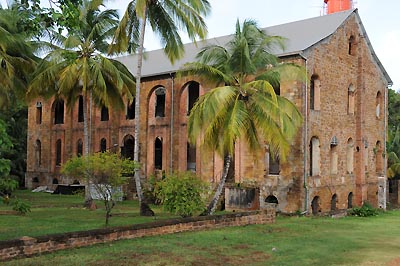 Devil's Island. Potentially the most feared penal colony in history, Devil's Island saw 60,000 prisoners sail in its direction and only 2,000 make it out alive. An isolated island off the coast of French Army Guiana in the Atlantic ocean, Napoleon III and the French chose the island in 1852 because it was nearly impossible to escape. Guards worked prisoners nearly to death during the day, building unending roads to nowhere and clearing trees. At night, they were shackled and left in the dark to be bitten by vampire bats that waited in the rafters. Some prisoners were kept in "bear pits" - holes dug into the ground and covered at the top by iron bars. The island's two most well-known residents were Alfred Dreyfus, a French Captain falsely convicted of treason, and Henri Charrière, an inmate who escaped the island and wrote a memoir about his time there. The book, Papillon, was adapted into a movie starring Steve McQueen and Dustin Hoffman.
Devil's Island. Potentially the most feared penal colony in history, Devil's Island saw 60,000 prisoners sail in its direction and only 2,000 make it out alive. An isolated island off the coast of French Army Guiana in the Atlantic ocean, Napoleon III and the French chose the island in 1852 because it was nearly impossible to escape. Guards worked prisoners nearly to death during the day, building unending roads to nowhere and clearing trees. At night, they were shackled and left in the dark to be bitten by vampire bats that waited in the rafters. Some prisoners were kept in "bear pits" - holes dug into the ground and covered at the top by iron bars. The island's two most well-known residents were Alfred Dreyfus, a French Captain falsely convicted of treason, and Henri Charrière, an inmate who escaped the island and wrote a memoir about his time there. The book, Papillon, was adapted into a movie starring Steve McQueen and Dustin Hoffman. -
5.
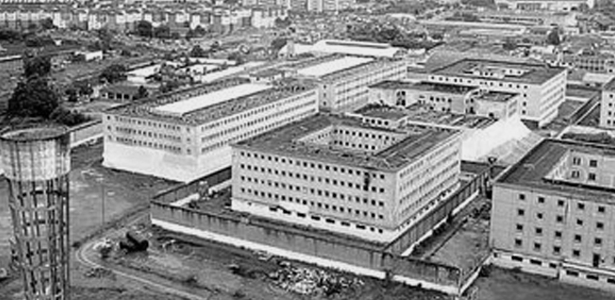 Carandiru. Penitentiary Despite its nearly century-long infamous history, Carandiru Penitentiary in São Paulo, Brazil, is most notorious for the events of a single day. During the Carandiru Massacre on October 2, 1992, police took the lives of 111 inmates in about 30 minutes. The events unfolded when an argument about a football match between two inmates devolved into a fight between rival gangs, which in turn sparked a prison riot. In the overcrowded prison that held more than twice its inmate capacity, the riot raged on for three hours until police entered the complex and began to fire. According to witnesses, police shot inmates at close range behind locked cell doors and unleashed dogs on the wounded. It took 20 years for any of the police involved to be punished for their brutality against the prisoners.
Carandiru. Penitentiary Despite its nearly century-long infamous history, Carandiru Penitentiary in São Paulo, Brazil, is most notorious for the events of a single day. During the Carandiru Massacre on October 2, 1992, police took the lives of 111 inmates in about 30 minutes. The events unfolded when an argument about a football match between two inmates devolved into a fight between rival gangs, which in turn sparked a prison riot. In the overcrowded prison that held more than twice its inmate capacity, the riot raged on for three hours until police entered the complex and began to fire. According to witnesses, police shot inmates at close range behind locked cell doors and unleashed dogs on the wounded. It took 20 years for any of the police involved to be punished for their brutality against the prisoners. -
6.
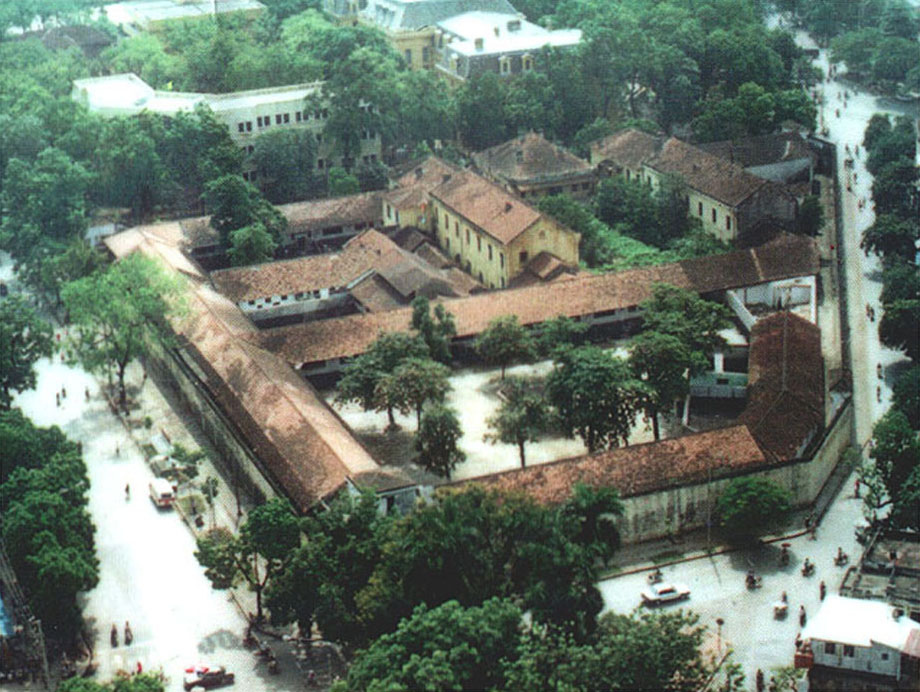 Hỏa Lò Prison. Originally opened by French colonists in 1896 to house Vietnamese rebels, the Hỏa Lò Prison ultimately became famous by a different name: the Hanoi Hilton. During the Vietnam War, Hỏa Lò Prison imprisoned American POWs like Congressman Sam Johnson and Senator John McCain, who tried to commit suicide twice during his stay. The length of the Vietnam War led to long periods of imprisonment for many POWs, some staying at the Hanoi Hilton for 8 years or more. While there, POWs were beaten, tied up by their wrists and hung from meat hooks, forced into extended solitary confinement, and used in propaganda films. They finally made it home after the Paris Peace Accords set them free and the war ended.
Hỏa Lò Prison. Originally opened by French colonists in 1896 to house Vietnamese rebels, the Hỏa Lò Prison ultimately became famous by a different name: the Hanoi Hilton. During the Vietnam War, Hỏa Lò Prison imprisoned American POWs like Congressman Sam Johnson and Senator John McCain, who tried to commit suicide twice during his stay. The length of the Vietnam War led to long periods of imprisonment for many POWs, some staying at the Hanoi Hilton for 8 years or more. While there, POWs were beaten, tied up by their wrists and hung from meat hooks, forced into extended solitary confinement, and used in propaganda films. They finally made it home after the Paris Peace Accords set them free and the war ended.
- REPLAY GALLERY
-

- Couple Of The Most Horrific Prisons In History Definitely Can Give You Nightmares
- NEXT GALLERY
-

- American Dialects Summary By Each State
Pitesti was a Communist prison built in Romania, most famous for its intense and brutal brainwashing experiments. Operating from 1949-1951, the Pitesti Experimentattempted to "re-educate" wealthy intellectuals, bourgeois landowners, religious rebels, and political dissidents through psychological torture. Guards forced prisoners' heads into buckets of urine and feces. In an effort to get prisoners to turn on one another, guards made prisoners torture each other by spitting and urinating in each other's mouths, among other even more disgusting things.
6/6
1/6
Categories:
Creepy



![20 Wild History Facts Not Everyone Knows <p>Not even the biggest history buffs can know it all, so what are some cool facts they might not have heard? <a href="https://trending.ebaumsworld.com/pictures/26-history-memes-that-dont-sugar-coat-the-past/87480685/">From World War II to the ancient Egyptians</a>, this gallery shares some fascinating, and rarely-read tidbits of history. </p><p><br></p><p>Although we think of the Egyptian empire as an ancient society, human history has spanned for much longer than most of us can comprehend. Famously, Cleopatra's rule was closer in time to the present day than it was to the construction of the pyramids. Believe it or not, the majority of human history took place before people could record it in writing, and even the earliest societies talk of "ancient" civilizations. For example, the first-ever joke in recorded history references "time immemorial," implying that even the ancient Sumerians thought of themselves as modern. Its subject matter is also something relatable for every human couple throughout history: wives passing gas on their husbands' laps. </p><p><br></p><p>“Something which has never occurred since time immemorial; a young woman did not [pass gas] in her husband’s lap.”</p><p><br></p><p>If you found that joke new and amusing - how could you not - then consider checking out the rest of this historical gallery full of facts that you probably haven't heard before. </p>](https://cdn.ebaumsworld.com/thumbs/2023/11/30/031941/87482076/history-facts-fixed.jpg)




0 Comments